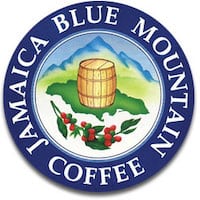At A Glance:
What Is Blue Mountain Coffee?
That’s probably the first question that popped into your head when someone told you about coffee that costs 60 dollars a pound. Well, to begin with, the coffee gets its name from the eponymous Blue Mountains of Jamaica (not to be confused with the Blue Mountains of Australia). Its price is a result of a wide variety of factors, not least of which is the relatively short supply of the Jamaican Blue Mountain (JBM) beans.
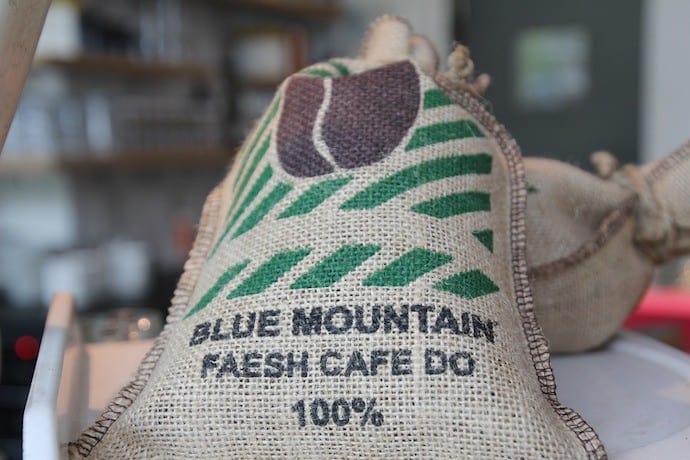
Where Does Blue Mountain Coffee Come From?
Jamaica’s Blue Mountain range is located on the Eastern side of the island, north of Kingston, the capital of Jamaica. It spans four Jamaican parishes: Portland, St. Thomas, St. Mary and St. Andrew. The island’s highest peak is part of the Blue Mountains range. These are the highest mountains in Jamaica and among the steepest in the entire world (1).
“The Blue Mountains area spans four of Jamaica’s parishes, St. Andrew to south, Portland to the north, St. Mary to the west and St. Thomas to the east. Arising 2,300 metres (7,500ft) they are some of the highest mountains in the Caribbean.”
Wallenford Estate
Growing coffee on the steep slopes of those mountains is no small feat. The conditions for premium Jamaica Blue Mountain coffee beans are precise and exacting with little to no wiggle room. Those conditions give rise to the unique flavors of Jamaican coffee, which we will explore next.
Why Is It so Expensive?
Like Kona beans, Jamaica Blue Mountain is among the most expensive coffees there is. But why is that so? Mostly Arabica type, these beans carry a premium price tag for many reasons. The growing conditions are only a small part of the story. To bear the coveted Blue Mountain seal, coffee beans have to be grown between 3,000 and 5,500 feet. Anything above that range is considered a nature preserve in Jamaica; anything under it simply doesn’t make the cut.
The altitude slows down the growth of the beans but that doesn’t fully cover their uniqueness. After all, coffee beans are grown at higher altitudes than that. Aside from the altitude, the volcanic soil of the mountains makes these beans ripen at almost half the speed of regular beans. The result is a denser bean with deep flavors.
Furthermore, these beans are sorted by hand with only flawless beans making the cut for Blue Mountain certification. That certification, by the way, is regulated by the Coffee Industry Board of Jamaica.
JBM coffee is so popular in Japan that a vast majority (about 80%) ends up in the Land of the Rising Sun. The remaining 20% is all that’s left to cover the rest of the world’s demand for this exclusive coffee.
This combination of factors ensures that every cup of genuine Blue Mountain coffee you drink is as good as the last. And you won’t soon forget how the last cup tasted. Once you consider the time and effort that go into every bag of beans, it will start to make sense why they’re so pricey and why we haven’t heard of any coffee subscription service that offers this coffee.
Related: Best Organic Coffee Beans
Finally, there’s really not much to go around. The stretch of the land where this coffee comes from is relatively tiny. The scarcity problem is compounded by a recent spate of hurricanes and disease outbreaks. At the end of the day, it’s an issue of supply and demand. The wonderful taste of Blue Mountain coffee has created a demand that Jamaica can’t hope to ever fully satisfy.
What Does It Taste Like?
Blue Mountain coffee is often described as one of the (if not the) best tasting coffees in the world. There are as many superlatives used for JBM coffee as there are people who have tried it. That reputation is well deserved but if we’re going to be a little more objective about it, you can expect a very smooth and clear taste with minimal bitterness.
Similar to Kenyan coffee the JBM vibrant acidity infuses every sip with strong floral notes and nutty overtones. That said, it might not be the best choice for people with sensitive stomachs. Instead, we advice choosing low acid coffee like Guatemalan coffee beans. The most salient characteristic of this exclusive strain is smoothness. It also makes great French Press coffee like these brands and variants. Whether you’re brewing it in an espresso machine, a French press or anything in between, the ease of drinking this coffee will impress every time.
We do not recommend the JBM coffee for cold brew though as the resulting drink may get too acidic so if you prefer this brew method, consider some of these instead.
Blue Mountain Coffee Scams and How to Avoid Them
As stated above, the only real Blue Mountain coffee is grown at a very specific altitude in a certain region of Jamaica. As such, it’s inspected and certified by the CIB of Jamaica. Like other commodities that have a reputation for excellence, Blue Mountain beans are subject to forgeries and imitations (2).
While the Jamaican authorities are making great strides in curtailing the sale of counterfeit coffee, the practice is still widespread. A lot of coffee coming out of other parts of the island, as well as coffee grown elsewhere, is sold as authentic JBM coffee.
Often, the packaging of the fake coffee beans is done convincingly enough to fool most buyers. Also, unless the errors on the label are obvious, it’s hard to tell the difference. However, there are a few things you can do to avoid falling prey to these fakes.
Related: Best Instant Coffee Brands
Buy From Reputable Dealers
If you’re looking for cheap coffee, this single origin coffee isn’t for you. You’re never going to “luck out” and find 100% pure Jamaican Blue Mountain coffee (or even Costa Rica coffee and Colombian coffee beans) at 10 dollars a pound. Any unnaturally big discount or special offer should be viewed with extreme suspicion.
Reputable sellers will charge what the coffee is worth. Coffee sellers that respect their product will be able to tell you the origin of the coffee as well as when it was roasted. Do some research and see what other people are saying about the supplier before you buy.
Check the Packaging
All Blue Mountain coffee that is grown in Jamaica is also roasted and packaged there. If it was packaged or roasted anywhere else, it’s a dead giveaway. Real Jamaican Blue Mountain coffee will always have a seal that certifies it as authentic. The seal can be forged, however, so it’s not a bulletproof guarantee. But the absence of a seal is a guarantee that something fishy is going on.
Be Careful With Blends
A blend can have any amount of authentic Blue Mountain beans and still be called a Blue Mountain blend. If it claims to be a Blue Mountain blend, it’s probably true, but the sellers are often reluctant to disclose the amount of Blue Mountain beans that made it into that blend. The last thing you want is to end up paying a premium price for a 90% locally-grown and sourced blend.
Ask Questions
If a dealer carries Blue Mountain coffee, they’re probably going to be happy to tell you all about it. Ask about the coffee’s provenance and if they can produce certificates of origin. You can also ask broader questions about when it was roasted and which farms it came from. Use the information in this article to help you.
Thousands of Jamaican farmers rely heavily on those coffee crops to earn a living. If you’re a Blue Mountain lover, do your part in keeping the coffee trade alive. Always make sure you’re buying authentic Jamaican beans.
How to Brew Blue Mountain Coffee
By now the point has been established that Blue Mountain is far from your everyday coffee. It’s hard to come by and it’s very pricey. Also, the fantastic taste of Blue Mountain coffee is a true treat for the palate. If you can afford to drink it every day, you might still be advised to save it for special occasions — lest you ruin your taste for it.
Recommended roast levels for this gourmet coffee include medium and medium dark roast. Naturally, that’s what most roasters offer.
Related: We reviewed some great tasting light roast coffee brands and variants.
The same general rules apply for this coffee as for most others, but some are worth mentioning.
- Store the coffee in a vacuum-sealed container until you’re ready to use it. Remember that exposure to oxygen degrades the flavor.
- If you’re working with whole beans, don’t grind them until it’s time to brew. Grind the quantity you need and keep the rest of the beans vacuum-sealed.
- Immersion is best for even and consistent extraction. Moka pots, French press, and drip techniques are all good choices.
- If possible, use a thermometer to make sure your water is at the recommended 205 °F. Go too far over that and you risk scalding the coffee. Go too far under and you won’t get a full extraction.
Espresso is not entirely excluded either. However, you’ll have better luck with Jamaican peaberry coffee. Peaberry beans roast better than split beans and will make a finer espresso while maintaining that signature taste.
Blue Mountain Coffee Beans Reviews
| Product | Details | Button | |
|---|---|---|---|
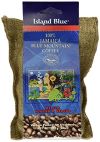
|
Island Blue -100% Jamaica Blue Mountain Ground Coffee |
|
 SEE ON AMAZON
SEE ON AMAZON
|
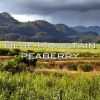
|
Volcanica Coffee Blue Mountain Peaberry Coffee |
|
Click to Check Price |
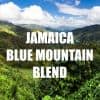
|
Volcanica Coffee Jamaica Blue Mountain Coffee Blend |
|
Click to Check Price |

- 100% Jamaican Blue Mountain Beans
- Certified by the Coffee Industry Board of Jamaica
- Medium Roast

- 100% Jamaican Blue Mountain Peaberry Coffee
- Certified by Jamaican Department of Agriculture
- Medium Roast

- 30% Jamaican Blue Mountain beans mixed with the finest mountain grown coffees
- Medium Roast
To get you started with some reputable vendors, we’ve selected a few authentic Blue Mountain coffee brands. You’re welcome to do your own research but these will get you started on the right foot.
1. Island Blue -100% Jamaica Blue Mountain Ground Coffee – Best Pre-ground
Specifications
100% Jamaican Blue Mountain Beans
- Certified by the Coffee Industry Board of Jamaica
- Medium Roast
Island Blue is grown and packaged by one of the oldest coffee companies in Jamaica. It’s the only company on the island with ISO 9001 certification and the quality of their coffee reflects it.
This is a pre-ground coffee so it won’t have quite the punch of the whole beans that you grind yourself, but it’s a very decent substitute if you don’t have a grinder at hand. The flavor is as good as you’d expect from Blue Mountain coffee.
It’s vacuum-packed with an outer burlap bag which gives it a certain charm. Island Blue coffee makes a great gift for hard-core coffee lovers and Blue Mountain coffee connoisseurs. It’s also a great way to introduce people to the fantastic flavor of Blue Mountain coffee. There is a large range of bag sizes that will accommodate every budget.
Overall, this is a good coffee to buy if you don’t have a problem with grinding beans yourself. You’ll get all the flavor of Blue Mountain beans with no fillers or frills.
2. Volcanica Coffee Blue Mountain Peaberry Coffee – Best Quality Blue Mountain Coffee
Specifications
100% Jamaican Blue Mountain Peaberry Coffee
- Certified by Jamaican Department of Agriculture
- Medium Roast
There’s great coffee and then there’s Blue Mountain peaberry coffee. This coffee, grown in Wallenford estate, is one of the rarest in the world (3). The selection of peaberry beans from a crop is minute. Peaberry beans are those in which only one of the two beans is fertilized. The resulting bean is oval rather than flat and only occurs in about five percent of all coffee berries.
There is some disagreement as to the reasons why the peaberry beans have such a distinct and rich flavors. But whether it’s about their shape (that’s considered better for roasting) or the careful sorting process, it’s beyond dispute that these beans elevate the already exquisite Blue Mountain coffee to a new level.
For the people at Volcanica Coffee, bringing this coffee to your door is a labor of love. The beans are roasted and then immediately packaged after an order is placed. You’ll never have to wonder about stale beans with Volcanica Coffee. The berries are brought to a perfect medium roast, batch after batch, with perfect consistency. If you prefer, you can have them ground to your desired size and delivered pre-ground as well.
3. Volcanica Coffee Jamaica Blue Mountain Coffee Blend – Best Blue Mountain Blend
Specifications
30% Jamaican Blue Mountain beans mixed with the finest mountain grown coffees
- Medium Roast
So you’re not ready to commit to the admittedly high price of Blue Mountain coffee. No problem! There’s a way you can get a close approximation without breaking the bank. Go with a good blend. Now, in a previous section, we warned against blends but this one is very much worth buying.
This high-quality blend is good enough to be endorsed by experts. The same methodically selected beans that are used in 100% certified Blue Mountain coffee end up in this blend. The blend, however, contains a full 30% of pure Blue Mountain beans, while the remaining 70% is made up of other fine mountain beans. The beans are carefully chosen to not clash with the flavor of the authentic Blue Mountain beans, producing a pristine blend that almost amounts to unblended.
This is the only blend that has received the approval of the Jamaican Coffee Board. As with other Volcanica coffees, this one is roasted when you place your order and you can order it pre-ground in any size you want.
The previous advice still stands — don’t trust blends. Unless you’re dealing with Volcanica’s Blue Mountain coffee blend. It’s proven to be a genuinely worthy stand-in for the real deal.
The Bottom Line
The debate about the best coffee in the world will never be truly settled. But no matter where you stand and which one’s your favorite, Jamaican Blue Mountain coffee can’t be ignored. The flavor profile of Jamaican coffee is truly exceptional.
From the moment ripe coffee berries are picked off the bushes on the slopes of the Blue Mountain range, every step ensures their utmost quality. Don’t be fooled though, there are a lot of counterfeit brands and blends out there. Make sure your beans are certified with the Blue Mountain seal.
If you’re just looking to see what the hype is all about, it’s ok to start with a blend. The Volcanica Coffee Blue Mountain blend is an excellent way to get started. If you’re a Blue Mountain veteran, treat your taste buds to the sublime flavor of Volcanica’s Blue Mountain Peaberry Coffee. You won’t regret it, it’s a heaven in a cup of coffee.
FAQs
The best way to brew Jamaican Blue Mountain coffee is whatever your favorite brew method is. It is especially delicious in French roast, drip machines, and pour over. We recommend a Hario V60 to get the nuances of this top-rated bean, but you really can’t go wrong.
You should store Jamaican Blue Mountain coffee beans the way you would store any high-quality specialty coffee beans: away from moisture, heat, oxygen, and light. Furthermore, you should plan to use them all within a week or two to best enjoy their unique character.
The best grind for Jamaican Blue Mountain beans is whatever your coffee brewing method recommends. For a Hario V60, for example, try a grind just slightly finer than medium on your grinder; this will give good extraction and help highlight the brighter nuances of these high-elevation, slow-growing beans.
The company Jamblum offers decaffeinated JBM beans but they’re often out of stock. Volcanica Coffee, on the other hand, offers half-caff JBMs. You can check our favorite decaf coffee beans here.
- Blue Mountains (Jamaica). (2019, September 14). Retrieved from https://en.wikipedia.org/wiki/Blue_Mountains_(Jamaica)
- Dewar, T. (n.d.). Crackdown planned on fake Blue Mountain coffee. Retrieved from http://www.jamaicaobserver.com/news/Crackdown-planned-on-fake-Blue-Mountain-coffee_18015328
- Coffee Facts. (n.d.). Retrieved from http://wallenford.com/about-coffee/coffee-facts.php

Coffee expert and industry insider, I’ve dedicated years to mastering the art and science of coffee making. From scrutinizing particle fineness to evaluating burr shapes, I delve into the minutiae that elevate coffee from good to exceptional. Whether it’s a complex pour-over or a robust espresso, my insights cater to those who don’t just drink coffee, but experience it.

